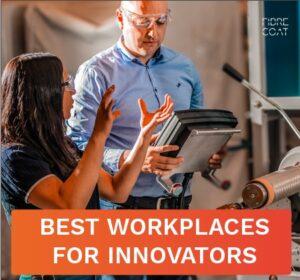
FibreCoat named one of Fast Company’s Best Workplaces for Innovators
FibreCoat, a world leader in the development and production of advanced coated fibres, has been named one of Fast Company’s Best Workplaces for Innovators for 2025.
The prestigious list honours organisations from around the globe that, from open collaboration to cross-disciplinary problem-solving, successfully create the conditions for innovation and support employees turning ambitious ideas into groundbreaking products and services.
FibreCoat’s materials combine the properties of metals and fibres, offering lightweight, ultra-resilient solutions for applications in mobility, construction, aerospace, and beyond. Founded in Germany in 2020 and now operating production sites in Aachen, Rustavi (Georgia), and Gorlice (Poland), the company has pioneered a novel technology to coat metals and plastics onto fibres during the fibre-spinning process.
This approach combines the strength and flexibility of fibres with the functional properties of the coating material, unlocking applications in electromagnetic shielding, thermal protection, and structural reinforcement.
Over the past year, FibreCoat, which employs around 42 members of staff, has launched a number of industry-first products including a radar-absorbing composite for stealth applications and cost-efficient conductive fibres for EV and satellite markets. These advances were made possible thanks to the company’s collaborative, high-trust culture, where engineers, scientists, and production teams are encouraged to pursue ideas and test new approaches quickly.
One of the clearest examples of how the culture breeds innovation can be seen in the development of FibreCoat’s own in-house spinning line, a project initiated by a former student employee who has since grown to lead the company’s R&D department.
The project drew on ideas from across the company: the original in-house build proposal came from one employee, a modular container design from another, a new feeding system from a third, and an innovative coating method from a fourth. This open, bottom-up approach has already drawn global attention.
Dr Robert Brüll, CEO of FibreCoat, said:
‘We often speak of innovation as if it simply happens by itself. But it comes from people. My senior team and I have worked hard to develop the kind of culture where anyone can speak up, challenge assumptions, experiment, and push for higher standards. The in-house spinning line is a perfect example: it began as one person’s idea, grew through contributions from across the team, and is now a key strategic advantage for us. Being recognised by Fast Company is an honour. But it also confirms something we already knew: that our people are our greatest asset.’
Unlike many manufacturing companies, FibreCoat has embedded innovation into every layer of its operations. The flat organisational structure accelerates decision-making, individuals are trusted to make sound decisions, and the company actively removes barriers to experimentation and friction of all kinds.
It’s thanks to this culture that young talent, often drawn from RWTH Aachen and FH Aachen, can take ownership of high-impact projects and make breakthroughs.
FibreCoat’s materials, which are lightweight, cost-effective, high-performance and have widespread applications, have proven themselves in a number of industries, and are now being viewed as a key solution to problems faced by the space sector. Spacecraft, from launchers to satellites, must withstand harsh conditions, including intense radiation, extreme temperatures, and electromagnetic interference (EMI). They must also be as lightweight as possible for reasons of efficiency and cost-effectiveness.
The World Economic Forum has predicted that the global space ecosystem will reach $1.8 trillion in value by 2035, in part due to growing demand for space-enabled services across the global economy.
The Fast Company list is compiled through a competitive selection process that evaluates companies on measurable innovation outcomes, investment in research and development, and employee empowerment. This year’s honourees include leading multinationals, start-ups, and non-profits across industries ranging from technology to healthcare.